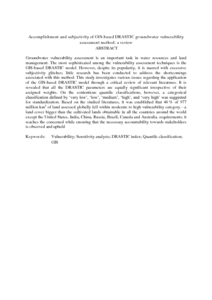Citation
Hamza, Salem M. and Ahsan, Amimul and Imteaz, Monzur Alam and Rahman, Ataur and Mohamed, Thamer Ahmed and Ghazali, Abdul Halim
(2015)
Accomplishment and subjectivity of GIS based DRASTIC groundwater vulnerability assessment method: a review.
Environmental Earth Sciences, 73 (7).
pp. 3063-3076.
ISSN 1866-6280; ESSN: 1866-6299
Abstract
Groundwater vulnerability assessment is an important task in water resources and land management. The most sophisticated among the vulnerability assessment techniques is the GIS-based DRASTIC model. However, despite its popularity, it is marred with excessive subjectivity glitches; little research has been conducted to address the shortcomings associated with this method. This study investigates various issues regarding the application of the GIS-based DRASTIC model through a critical review of relevant literatures. It is revealed that all the DRASTIC parameters are equally significant irrespective of their assigned weights. On the contentious quantile classifications, however, a categorical classification defined by ‘very low’, ‘low’, ‘medium’, ‘high’, and ‘very high’ was suggested for standardization. Based on the studied literatures, it was established that 46 % of 977 million km2 of land assessed globally fell within moderate to high vulnerability category—a land cover bigger than the cultivated lands obtainable in all the countries around the world except the United States, India, China, Russia, Brazil, Canada and Australia. requirements; it reaches the concerned while ensuring that the necessary accountability towards stakeholders is observed and upheld.
Download File
![[img]](http://psasir.upm.edu.my/43636/1.hassmallThumbnailVersion/Accomplishment%20and%20subjectivity%20of%20GIS-based%20DRASTIC%20groundwater%20vulnerability%20assessment%20method%20a%20review.pdf)  Preview |
|
PDF (Abstract)
Accomplishment and subjectivity of GIS-based DRASTIC groundwater vulnerability assessment method a review.pdf
Download (105kB)
| Preview
|
|
Additional Metadata
Actions (login required)
 |
View Item |

